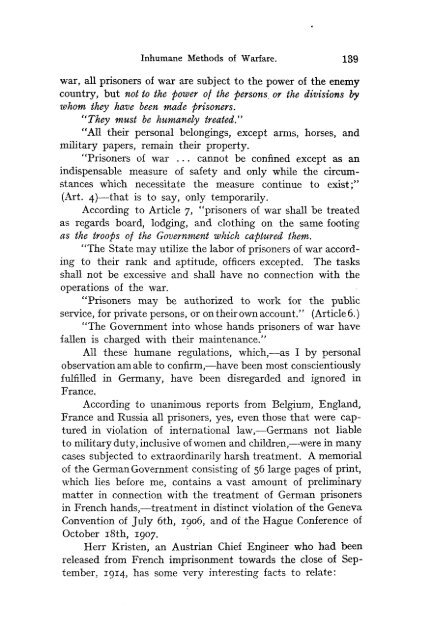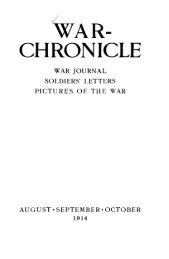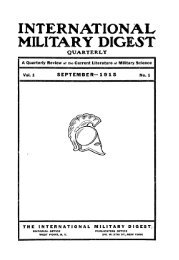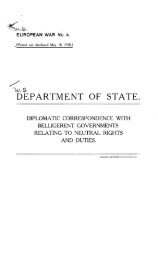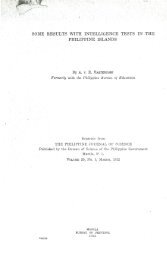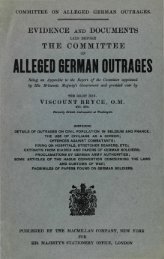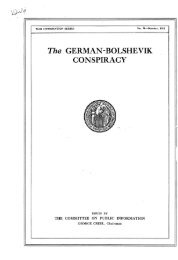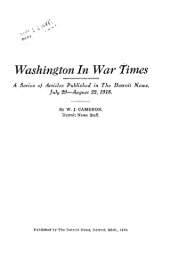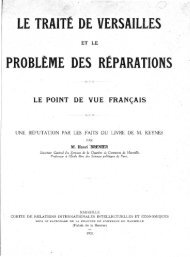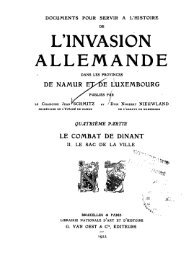- Page 1:
ï s r • I • «* *-?(ÊF jr r'
- Page 4 and 5:
• Copyright 1915 by Georg Reimer
- Page 6 and 7:
IV A Foreword. most brilliant judic
- Page 8 and 9:
VI A Foreword. to do. And I hold th
- Page 11 and 12:
CONTENTS. PART ONE. Page: Rules and
- Page 13 and 14:
PART ONE. Rules and Regulations of
- Page 15 and 16:
The Neutrality of Belgium. 3 in fav
- Page 17 and 18:
The Neutrality of Belgium. 5 "Gentl
- Page 19 and 20:
The Neutrality of Belgium. 7 cellor
- Page 21 and 22:
The Neutrality of Belgium. •9 its
- Page 23 and 24:
The Neutrality of Belgium. 11 We th
- Page 25 and 26:
The Neutrality of Belgium. 13 nothi
- Page 27 and 28:
The Neutrality of Belgium. 15 that
- Page 29 and 30:
The Neutrality of Belgium. 17 Belgi
- Page 31 and 32:
The Neutrality of Belgium. 19 Grey
- Page 33 and 34:
The Neutrality of Belgium. 21 but o
- Page 35 and 36:
The Neutrality of Belgium. 23 Omega
- Page 37 and 38:
The Neutrality of Belgium. 25 i "Ne
- Page 39 and 40:
The Neutrality of Belgium. 27 the d
- Page 41 and 42:
The Neutrality of Belgium. 29 "Thro
- Page 43 and 44:
The Neutrality of Belgium. 31 "From
- Page 45 and 46:
The Neutrality of Belgium. 33 which
- Page 47 and 48:
The Neutrality of Belgium. 35 Imper
- Page 49 and 50:
The Neutrality of Belgium. 37 3. Th
- Page 51 and 52:
The Neutrality of Belgium. 39 divis
- Page 53 and 54:
The Neutrality of Belgium. 41 Evide
- Page 55 and 56:
The Neutrality of Belgium. 43 There
- Page 57 and 58:
The Neutrality of Belgium. 45 subst
- Page 59 and 60:
Mobilization and the Morality of Na
- Page 61 and 62:
Violation of Congo Acts. Colonial W
- Page 63 and 64:
Violation of Congo Acts. Colonial W
- Page 65 and 66:
Violation of Congo Acts. Colonial W
- Page 67 and 68:
Violation of Congo Acts. Colonial W
- Page 69 and 70:
The Employment of Barbarous and War
- Page 71 and 72:
The Employment of Barbarous and War
- Page 73 and 74:
Violation of the Neutral Suez Canal
- Page 75 and 76:
Violation of the Neutral Suez Canal
- Page 77 and 78:
Violation of the Neutral Suez Canal
- Page 79 and 80:
Chinese Neutrality and Kiao-Chau. "
- Page 81 and 82:
Chinese Neutrality and Kiao-Chau. 6
- Page 83 and 84:
Chinese Neutrality and Kiao-Chau. 7
- Page 85 and 86:
Chinese Neutrality and Kiao-Chau. 7
- Page 87 and 88:
The Use of Dum-Dum Bullets. 75 empi
- Page 89 and 90:
The Use of Dum-Dum Bullets. 77' aga
- Page 91 and 92:
The Use of Dum-Dum Bullets. 79 to m
- Page 93 and 94:
The Use of Dum-Dum Bullets. 81 inte
- Page 95 and 96:
Treatment of Diplomatic Representat
- Page 97 and 98:
Treatment of Diplomatic Representat
- Page 99 and 100: Violations of Red Cross Rules. 87 l
- Page 101 and 102: Violations of Red Cross Rules. 89 5
- Page 103 and 104: Violations of Red Cross Rules. 91 u
- Page 105 and 106: Violations of Red Cross Rules. 93 a
- Page 107 and 108: Violations of Red Cross Rules. 95 t
- Page 109 and 110: Violations of Red Cross Rules. 97 s
- Page 111 and 112: Violations of Red Cross Rules. 99 t
- Page 113 and 114: Violations of Red Cross Rules. 101
- Page 115 and 116: Violations of Red Cross Rules. 103
- Page 117 and 118: Violations of Red Cross Rules. 105
- Page 119 and 120: German Treatment of Prisoners and W
- Page 121 and 122: German Treatment of Prisoners and W
- Page 123 and 124: Franc-Tireur Warfare and Cruelty. I
- Page 125 and 126: Franc-Tireur Warfare and Cruelty. 1
- Page 127 and 128: Franc-Tireur Warfare and Cruelty. 1
- Page 129 and 130: Franc-Tireur Warfare and Cruelty. 1
- Page 131 and 132: Franc-Tireur Warfare and Cruelty. 1
- Page 133 and 134: Franc-Tireur Warfare and Cruelty. 1
- Page 135 and 136: Franc-Tireur Warfare and Cruelty. 1
- Page 137 and 138: Franc-Tireur Warfare and Cruelty. 1
- Page 139 and 140: Franc-Tireur Warfare and Cruelty. 1
- Page 141 and 142: Franc-Tireur Warfare and Cruelty. 1
- Page 143 and 144: French Outrages. 131 to the ground
- Page 145 and 146: English Outrages. 133 Boer concentr
- Page 147 and 148: The Frenzy of France. 135 made a st
- Page 149: German Restraint and Order. 137 the
- Page 153 and 154: Inhumane Methods of Warfare. 141 An
- Page 155 and 156: Inhumane Methods of Warfare. 143 fr
- Page 157 and 158: Atrocities of Allied Troops. 145 ha
- Page 159 and 160: Atrocities of Allied Troops. 147 I
- Page 161 and 162: Atrocities of Allied Troops. 149 ve
- Page 163 and 164: Slaughter of Prisoners. 151 which m
- Page 165 and 166: Compulsory Treason. 153 the Frenchm
- Page 167 and 168: Premiums for Murder, etc. 155 this
- Page 169 and 170: Premiums for Murder, etc. 157 serva
- Page 171 and 172: Premiums for Murder, etc. 159 their
- Page 173 and 174: Russian Atrocities in East Prussia.
- Page 175 and 176: Russian Atrocities in East Prussia.
- Page 177 and 178: Russian Atrocities in East Prussia.
- Page 179 and 180: Russian Atrocities in East Prussia.
- Page 181 and 182: Pogroms and Other Russian Atrocitie
- Page 183 and 184: Pogroms and Other Russian Atrocitie
- Page 185 and 186: CHAPTER XIV. 173- The German Admini
- Page 187 and 188: German Administration in Belgium. 1
- Page 189 and 190: German Administration in Belgium. 1
- Page 191 and 192: Private Property in War. 179 perty,
- Page 193 and 194: The Conduct of German Troops. 181 t
- Page 195 and 196: The Conduct of German Troops. 183 c
- Page 197 and 198: The Conduct of German Troops. 185 p
- Page 199 and 200: Plundering and Destruction of Prope
- Page 201 and 202:
Plundering and Destruction of Prope
- Page 203 and 204:
Plundering and Destruction of Prope
- Page 205 and 206:
Plundering and Destruction of Prope
- Page 207 and 208:
Plundering and Destruction of Prope
- Page 209 and 210:
Ruses of War and Official Lies. 197
- Page 211 and 212:
Ruses of War and Official Lies. 199
- Page 213 and 214:
Ruses of War and Official Lies. 201
- Page 215 and 216:
The Destruction of Telegraph Cables
- Page 217 and 218:
The Triple Entente's Vendetta of Li
- Page 219 and 220:
The Triple Entente's Vendetta of Li
- Page 221 and 222:
The Triple Entente's Vendetta of Li
- Page 223 and 224:
The Triple Entente's Vendetta of Li
- Page 225 and 226:
The Triple Entente's Vendetta of Li
- Page 227 and 228:
The Triple Entente's Vendetta of Li
- Page 229 and 230:
The Triple Entente's Vendetta of Li
- Page 231 and 232:
The Triple Entente's Vendetta of Li
- Page 233 and 234:
The Triple Entente's Vendetta of Li
- Page 235 and 236:
The Triple Entente's Vendetta of Li
- Page 237 and 238:
+ Add. — Subtract The Triple Ente
- Page 239 and 240:
The Triple Entente's Vendetta of Li
- Page 241 and 242:
CHAPTER XXI. 229 A Few Remarks upon
- Page 243 and 244:
French and Belgian "Atrocity Books.
- Page 245 and 246:
French and Belgian "Atrocity Books.
- Page 247 and 248:
French and Belgian "Atrocity Books.
- Page 249 and 250:
French and Belgian "Atrocity Books.
- Page 251 and 252:
German Refutations and Investigatio
- Page 253 and 254:
German Refutations and Investigatio
- Page 255 and 256:
German Refutations and Investigatio
- Page 257 and 258:
German Refutations and Investigatio
- Page 259 and 260:
Art and Warfare. 247 by the French
- Page 261 and 262:
Art and Warfare. 249 On the 28th of
- Page 263 and 264:
Art and Warfare. 251 pressly forbid
- Page 265 and 266:
Bombardments by Aeroplanes. 253 the
- Page 267 and 268:
Bombardments by Aeroplanes. 255 the
- Page 269 and 270:
Bombardments by Aeroplanes. 257 bee
- Page 271 and 272:
English Business Morals. 259 Contin
- Page 273 and 274:
English Business Morals. 261 means
- Page 275 and 276:
English Business Morals. 263 While
- Page 277 and 278:
Economie War in the English Colonie
- Page 279 and 280:
Economie War in the English Colonie
- Page 281 and 282:
Violations of Neutral States. 269 w
- Page 283 and 284:
Violations of Neutral States. 271 A
- Page 285 and 286:
PART TWO. Questions of Legality in
- Page 287 and 288:
England, Naval Laws and Ourselves.
- Page 289 and 290:
England, Naval Laws and Ourselves.
- Page 291 and 292:
England, Naval Laws and Ourselves.
- Page 293 and 294:
Starvation as a Weapon. 281 take pl
- Page 295 and 296:
Breaches of Sea-Law by England. 283
- Page 297 and 298:
Breaches of Sea-Law by England. 285
- Page 299 and 300:
Breaches of Sea-Law by England. 287
- Page 301 and 302:
Breaches of Sea-Law by England. 289
- Page 303 and 304:
Breaches of Sea-Law by England. 291
- Page 305 and 306:
Breaches of Sea-Law by England. 293
- Page 307 and 308:
Breaches of Sea-Law by England. 295
- Page 309 and 310:
The North Sea as a Zone of War. 297
- Page 311 and 312:
The North Sea as a Zone of War. 299
- Page 313 and 314:
American "Neutrality." 301 logical
- Page 315 and 316:
American "Neutrality." 303 press (f
- Page 317 and 318:
American "Neutrality." 305 of to-da
- Page 319 and 320:
American "Neutrality." 307 •natio
- Page 321 and 322:
American "Neutrality." 309 We are,
- Page 323 and 324:
American "Neutrality." 311 its weak
- Page 325 and 326:
American "Neutrality." 313 IL i. Th
- Page 327 and 328:
American "Neutrality." 315. knows t
- Page 329 and 330:
American "Neutrality." 317 III. In
- Page 331 and 332:
American "Neutrality." 319 Prussian
- Page 333 and 334:
The Americans and Ourselves. 321 pa
- Page 335 and 336:
The Americans and Ourselves. 323 wi
- Page 337 and 338:
The Monroe Doctrine and Neutrality.
- Page 339 and 340:
The "Submarine Blockade." 327 for t
- Page 341 and 342:
The "Submarine Blockade." 329 of Lo
- Page 343 and 344:
The "Submarine Blockade." 331 misus
- Page 345 and 346:
The "Submarine Blockade." 333 right
- Page 347 and 348:
The "Submarine Blockade." 335 proce
- Page 349 and 350:
The "Submarine Blockade." 337 cease
- Page 351 and 352:
The "Submarine Blockade." 339, the
- Page 353 and 354:
The "Submarine Blockade." 341 accre
- Page 355 and 356:
The "Submarine Blockade." 343 of co
- Page 357 and 358:
The "Submarine Blockade." 345 consi
- Page 359 and 360:
The "Submarine Blockade." 347 "Germ
- Page 361 and 362:
The "Submarine Blockade." 349 of in
- Page 363 and 364:
The "Submarine Blockade." 351 IV. T
- Page 365 and 366:
The "Submarine Blockade." 353 or wh
- Page 367 and 368:
The "Submarine Blockade." 355 misun
- Page 369 and 370:
The "Submarine Blockade." 357 VI. I
- Page 371 and 372:
False Colors and Ruses of War. 359
- Page 373 and 374:
False Colors and Ruses of War. 361
- Page 375 and 376:
False Colors and Ruses of War. 363
- Page 377 and 378:
False Colors and Ruses of War. 365
- Page 379 and 380:
CHAPTER XXXI. 367 Aggravation of th
- Page 381 and 382:
The Case of the ' Lusitania." 369 t
- Page 383 and 384:
The Case of the "Lusitania." 371 we
- Page 385 and 386:
The Case of the "Lusitania." 373 "T
- Page 387 and 388:
The Case of the "Lusitania." 375 mi
- Page 389 and 390:
Exchange of German-American Notes.
- Page 391 and 392:
Exchange of German-American Notes.
- Page 393 and 394:
Exchange of German-American Notes.
- Page 395 and 396:
Exchange ôf German-American Notes.
- Page 397 and 398:
Exchange of German-American Notes.
- Page 399 and 400:
Exchange of German-American Notes.
- Page 401 and 402:
Exchange of German-American Notes.
- Page 403 and 404:
Exchange of German-American Notes.
- Page 405 and 406:
Italy's Betrayal of her Allies. 393
- Page 407 and 408:
Italy's Betrayal of her Allies. 395
- Page 409 and 410:
Italy's Betrayal of her Allies. 397
- Page 411 and 412:
CHAPTER XXXII. A Final Political Su
- Page 413 and 414:
A Final Political Survey. 401 arran
- Page 415 and 416:
A Final Political Survey. 403 For t
- Page 417:
A Final Political Survey. 405 This


